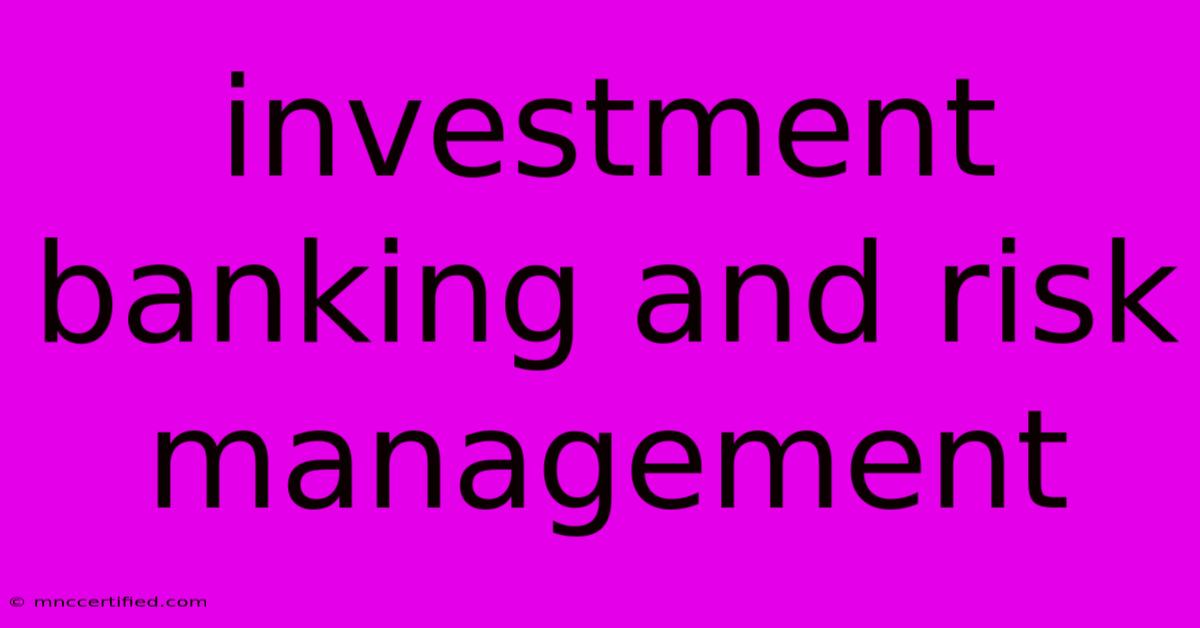Investment Banking And Risk Management

Table of Contents
Navigating the High Stakes: Investment Banking and Risk Management
Investment banking is a glamorous world of high finance, where billions of dollars are moved, deals are struck, and fortunes are made (or lost). While the potential rewards are significant, the inherent risks are equally substantial. This is where risk management steps in, playing a critical role in ensuring the stability and success of investment banking operations.
What is Investment Banking?
Investment banking is a specialized financial service that focuses on raising capital for corporations and governments. This involves a range of activities, including:
- Underwriting: Helping companies issue new securities like stocks and bonds to raise capital.
- Mergers and Acquisitions (M&A): Advising companies on mergers, acquisitions, and divestitures.
- Trading: Buying and selling securities on behalf of clients.
- Research: Providing investment recommendations and market analysis.
These activities are inherently risky. Markets are volatile, economic conditions can change rapidly, and individual decisions can have major consequences. This is why effective risk management is crucial for investment banks.
The Importance of Risk Management in Investment Banking
Risk management is not just about avoiding losses; it's about making informed decisions that balance potential rewards with potential risks. It involves a structured approach to identifying, analyzing, evaluating, and mitigating risks across the entire organization.
Here are some key reasons why risk management is vital in investment banking:
- Protecting Reputation and Brand: A major financial scandal or loss can severely damage an investment bank's reputation and erode client trust.
- Ensuring Financial Stability: Robust risk management practices help to prevent significant financial losses and maintain the bank's stability.
- Maintaining Investor Confidence: Investors need to be confident that their investments are safe and well-managed.
- Compliance with Regulations: The financial industry is heavily regulated, and investment banks must adhere to strict rules and guidelines.
Types of Risks in Investment Banking
Investment banks face a wide range of risks, including:
- Market Risk: Fluctuations in interest rates, exchange rates, and commodity prices can impact investment values.
- Credit Risk: The risk that a borrower will default on their debt obligations.
- Operational Risk: The risk of losses due to internal failures, errors, or fraud.
- Regulatory Risk: Changes in regulations can affect the bank's operations and profitability.
- Liquidity Risk: The risk of being unable to meet financial obligations due to insufficient cash flow.
- Reputational Risk: Negative publicity or scandals can damage the bank's reputation.
Risk Management Strategies
Investment banks utilize various strategies to manage these risks effectively:
- Risk Assessment: Identifying and analyzing potential risks across different business activities.
- Risk Mitigation: Implementing measures to reduce or eliminate identified risks.
- Risk Monitoring: Continuously tracking and evaluating risks, making adjustments as needed.
- Risk Control: Establishing policies and procedures to ensure compliance with risk management principles.
- Risk Reporting: Regularly communicating risk information to management and relevant stakeholders.
Key Tools and Techniques:
- Stress Testing: Simulating extreme market conditions to assess the bank's resilience.
- Scenario Analysis: Evaluating different potential outcomes and their impact on the bank.
- Value at Risk (VaR): A statistical measure of potential losses on investments.
- Risk Budgeting: Allocating resources to manage specific risks.
The Human Element in Risk Management
While technology and quantitative methods are crucial, human judgment remains essential in risk management. Investment bankers must be able to analyze complex situations, weigh potential outcomes, and make informed decisions. This requires:
- Strong Analytical Skills: The ability to interpret data, identify patterns, and make informed judgments.
- Ethical Conduct: A commitment to honesty, integrity, and compliance with regulations.
- Communication Skills: Effective communication is key to sharing information and collaborating with colleagues.
- Continuous Learning: The financial industry is constantly evolving, and investment bankers need to stay informed about emerging trends and risks.
The Future of Investment Banking and Risk Management
The industry is constantly evolving, driven by technological advancements, changing regulations, and global economic trends. The future of investment banking and risk management will likely be characterized by:
- Increased Use of Technology: AI, machine learning, and big data analytics will play an increasingly important role in risk assessment and decision-making.
- Greater Focus on Cybersecurity: Cyberattacks pose a significant threat to financial institutions, and cybersecurity will be a top priority.
- Increased Regulation: The financial industry will likely face stricter regulations in the future.
- Growing Importance of ESG (Environmental, Social, and Governance) Considerations: Investors are increasingly demanding that companies consider ESG factors in their investment decisions.
Conclusion
Risk management is not a separate department in investment banking; it is integral to every aspect of the business. By proactively identifying, managing, and mitigating risks, investment banks can protect their financial stability, maintain investor confidence, and ensure long-term success. As the industry evolves, risk management will continue to be a critical factor in navigating the complex and ever-changing world of high finance.

Thank you for visiting our website wich cover about Investment Banking And Risk Management. We hope the information provided has been useful to you. Feel free to contact us if you have any questions or need further assistance. See you next time and dont miss to bookmark.
Featured Posts
-
How Much Is Isibloom Without Insurance
Nov 09, 2024
-
Mc Donalds Fall Menu 5 Meals And New Items
Nov 09, 2024
-
Deadline For Colorado Health Insurance
Nov 09, 2024
-
2036 Olympics Usha Officials Need To Talk
Nov 09, 2024
-
See The 2025 Grammy Award Nominations
Nov 09, 2024